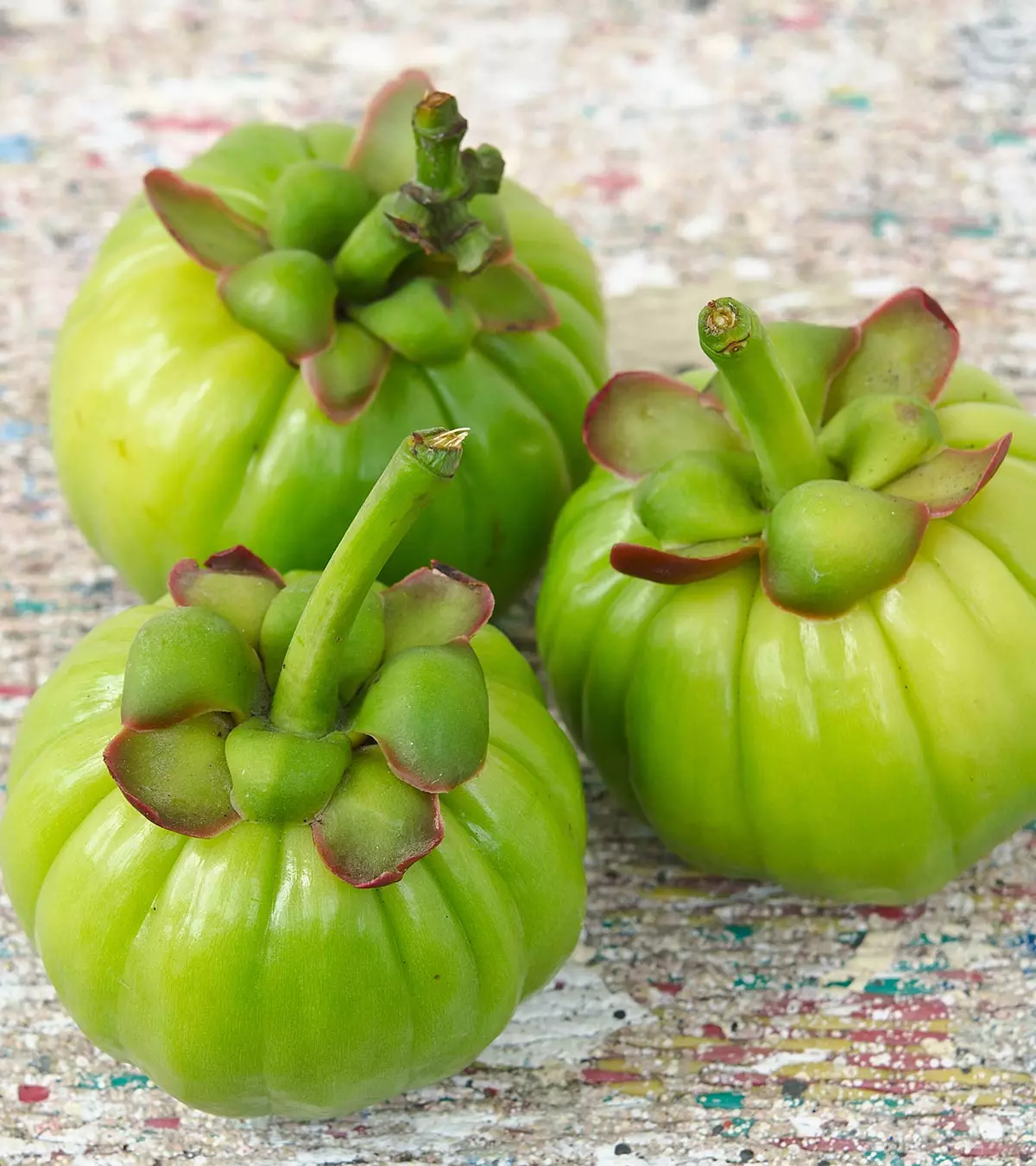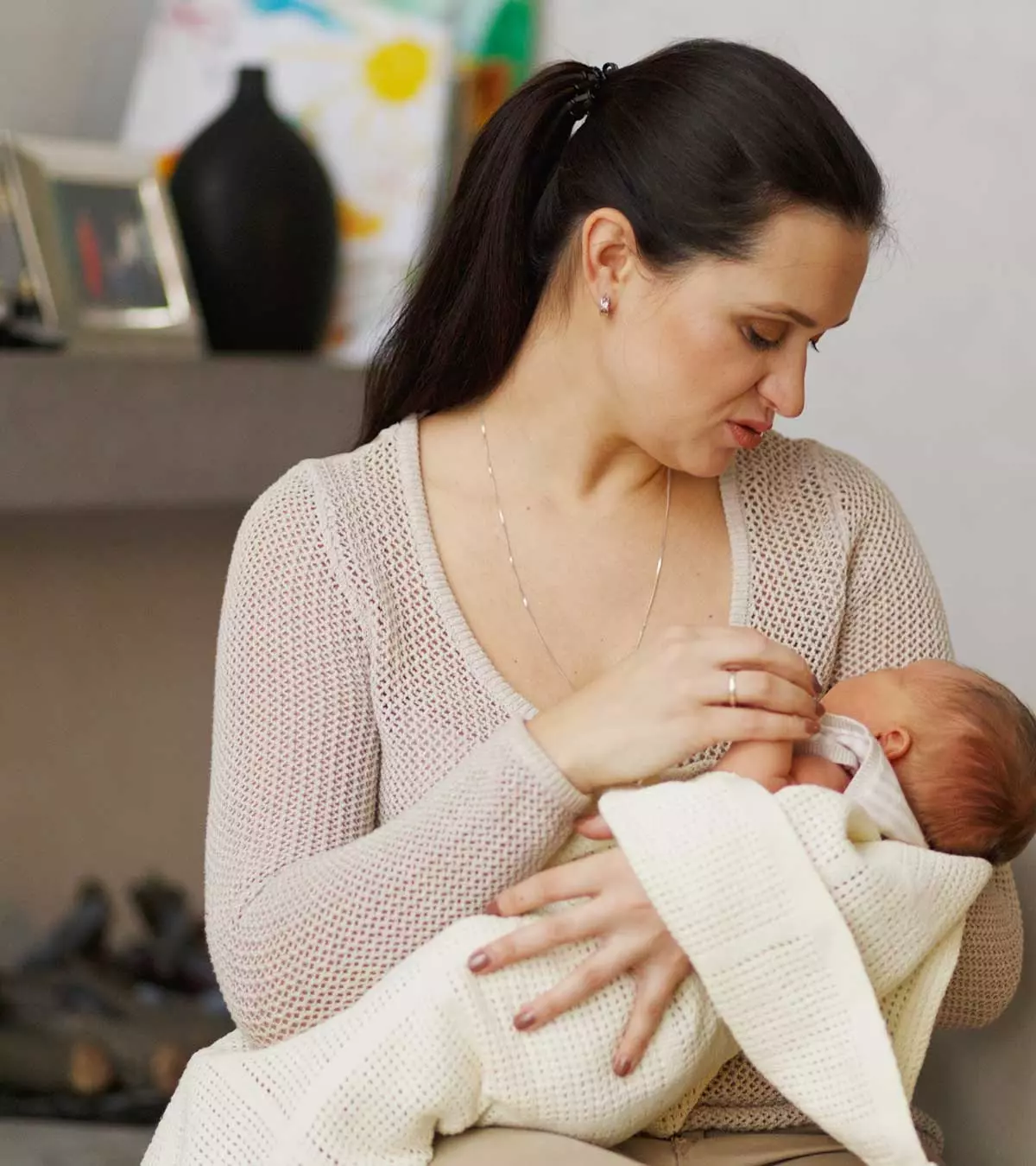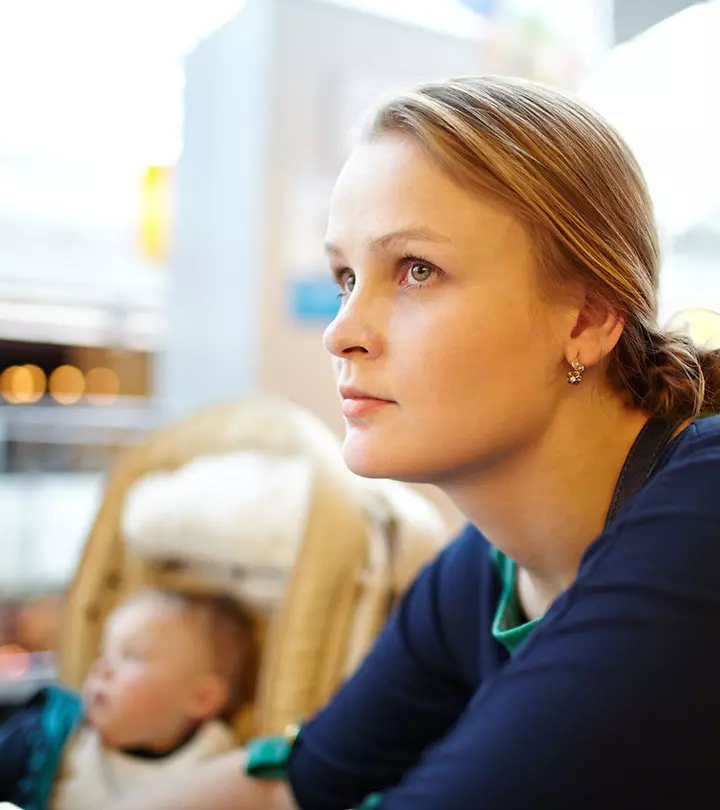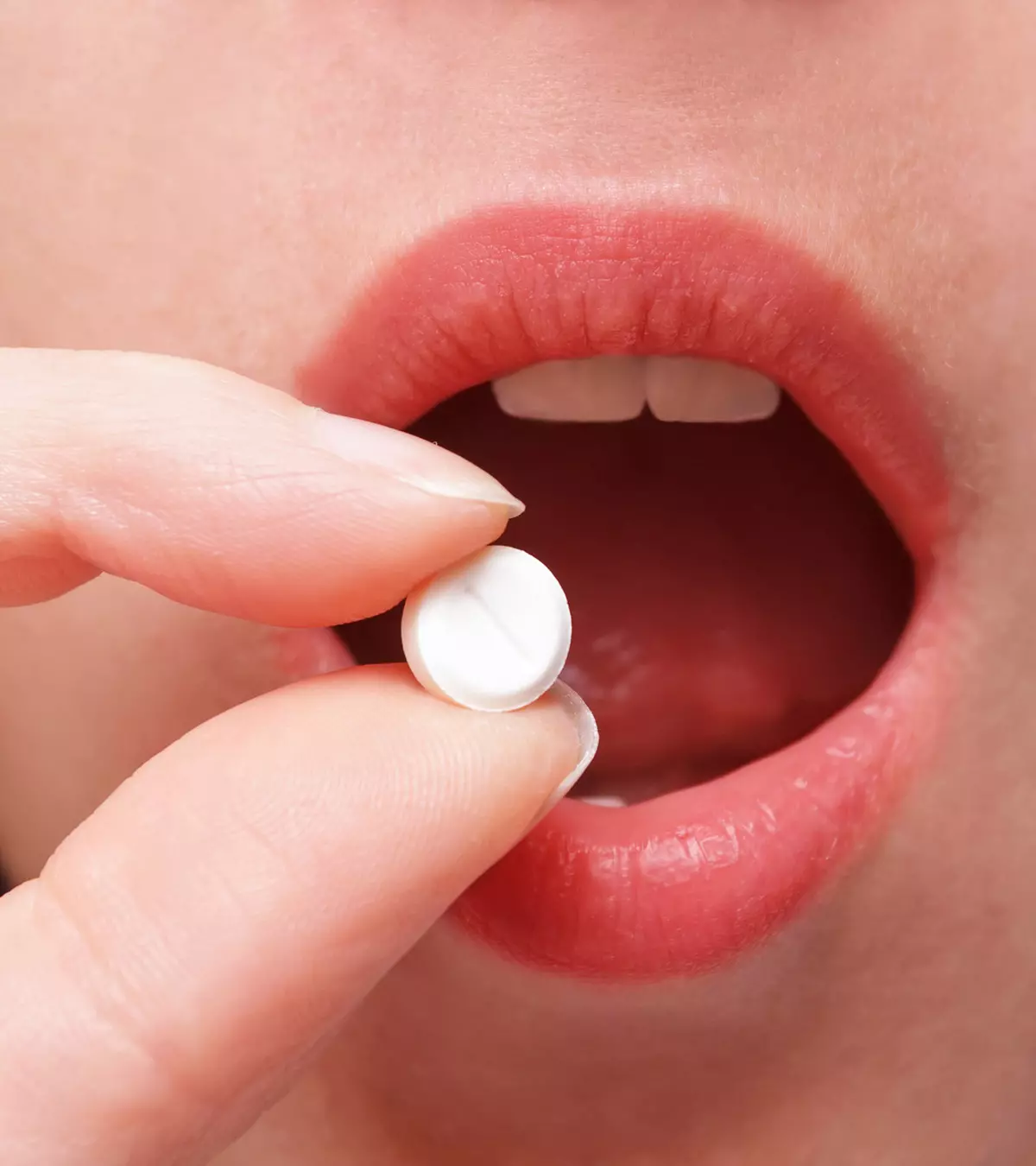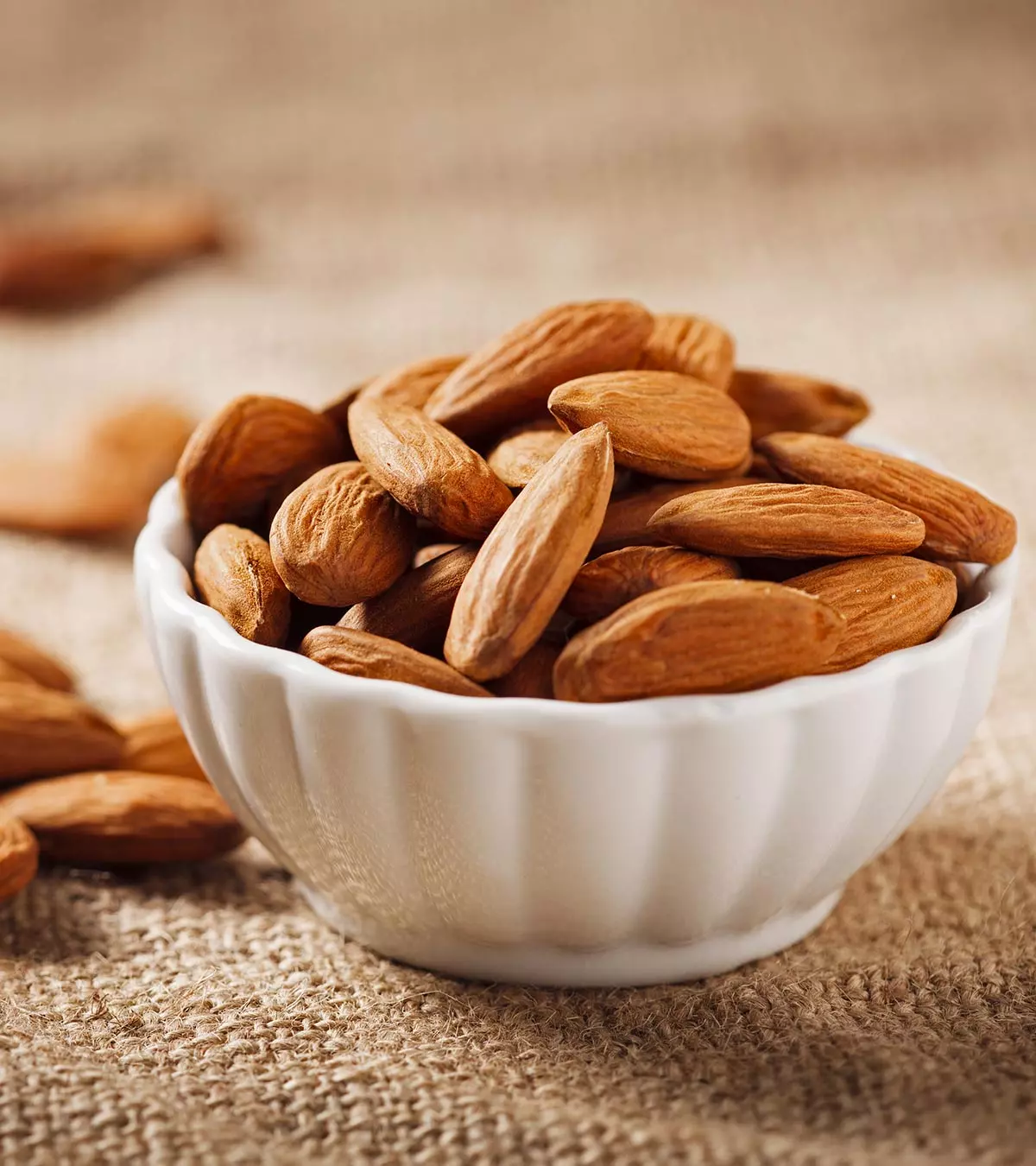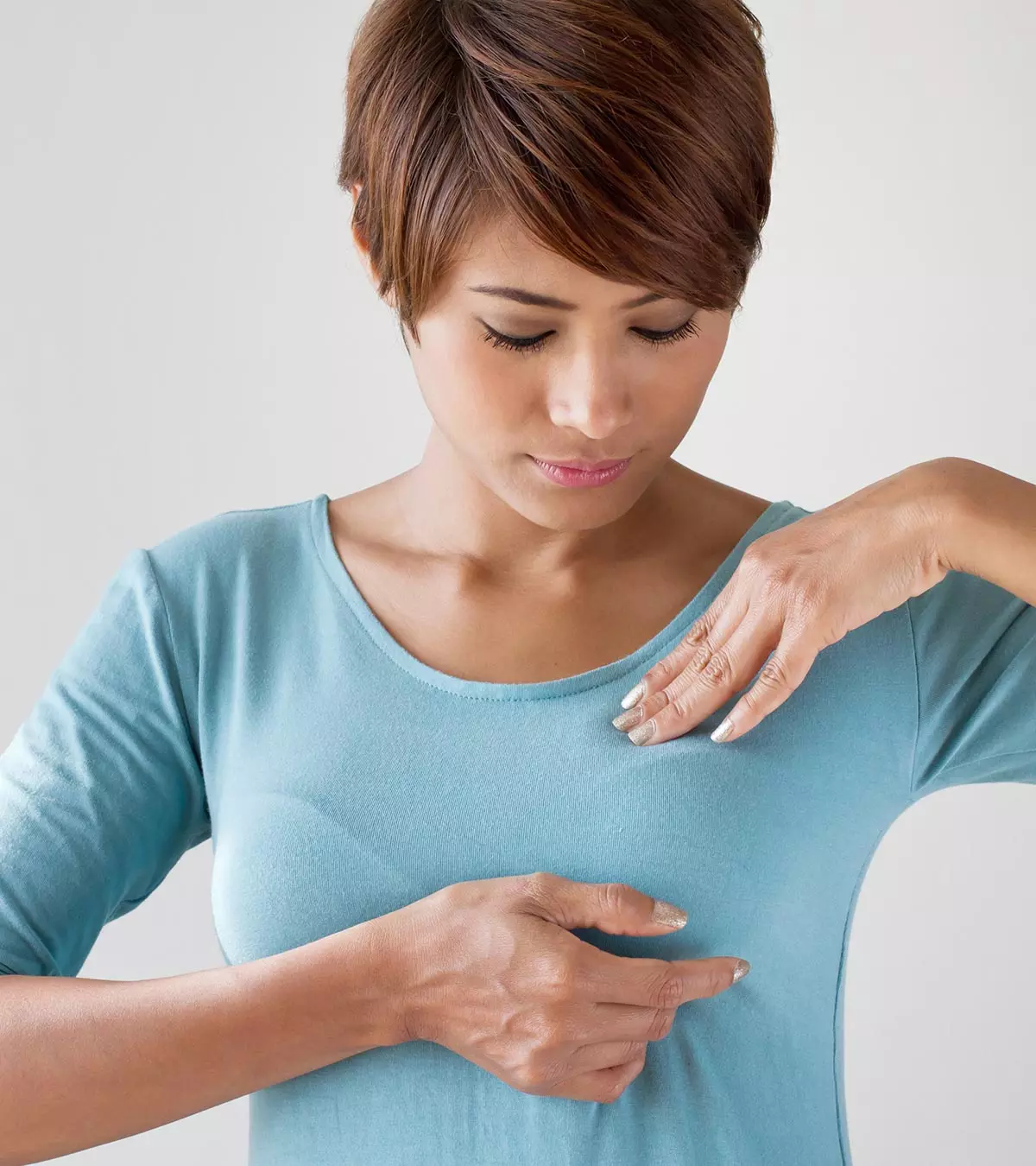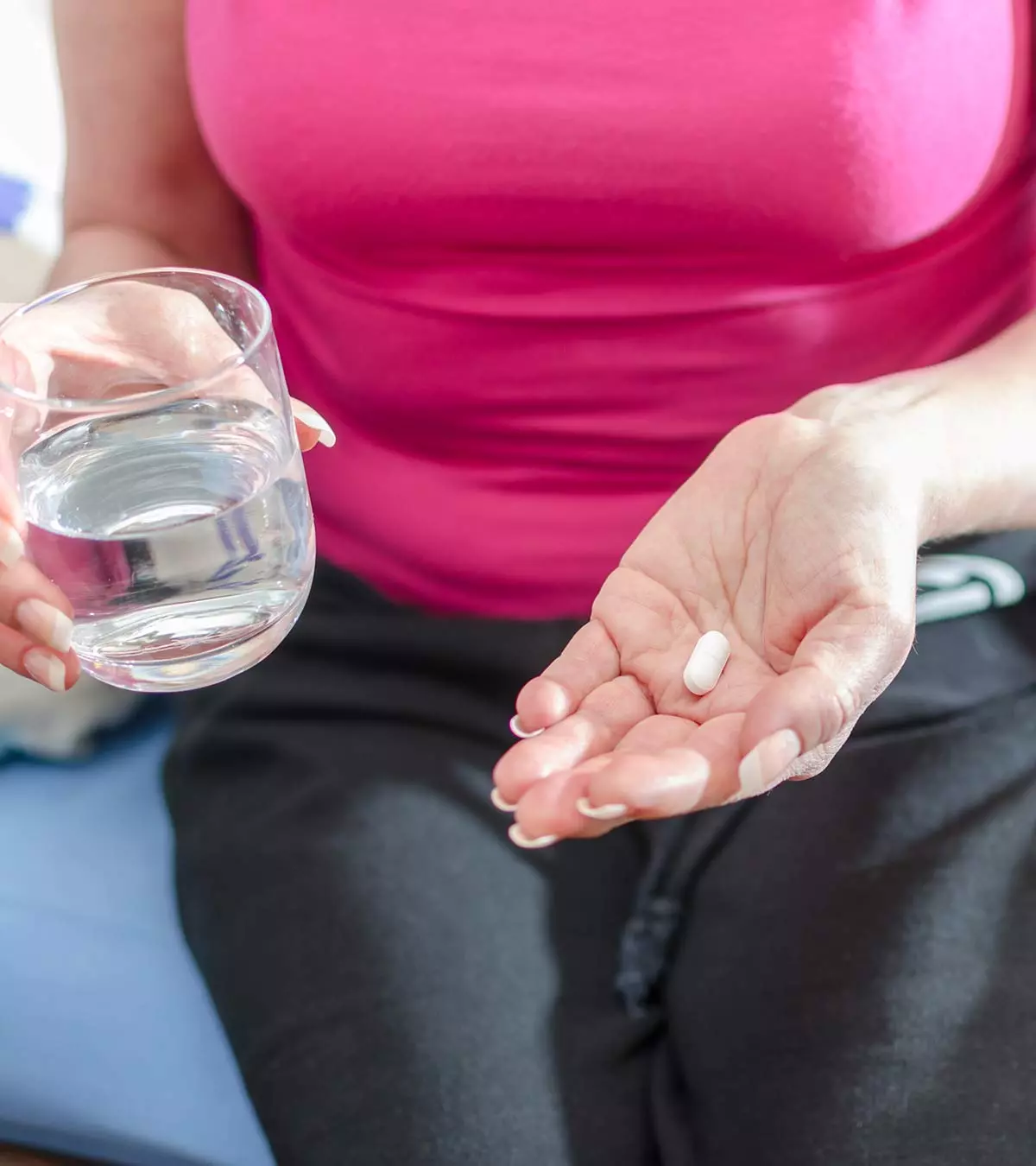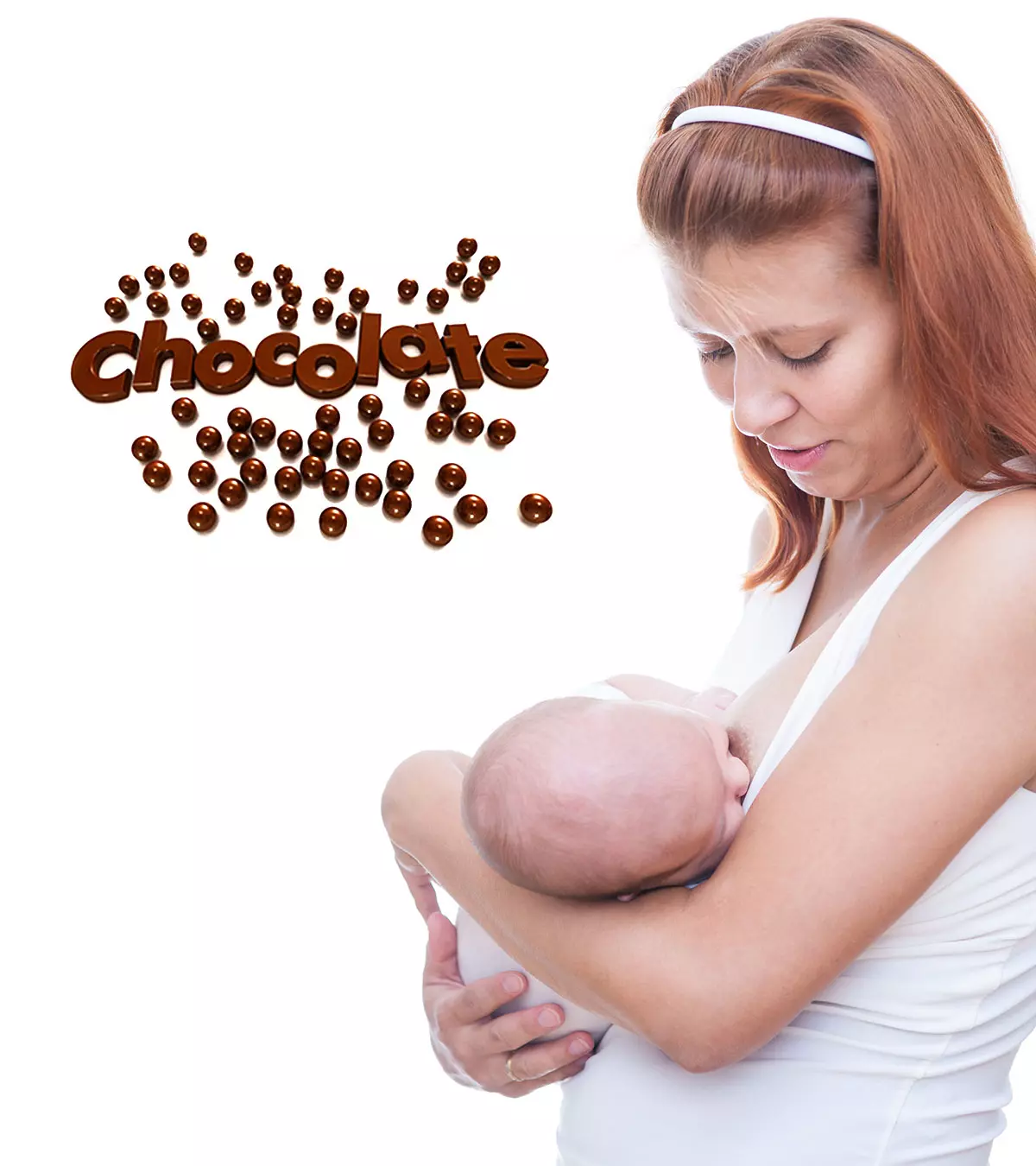
Image: Shutterstock
Chocolate is a delicious treat that many people love to relish. Therefore, craving for chocolate while breastfeeding isn’t uncommon for nursing women. But since chocolates contain caffeine, nursing mothers would contemplate if they can eat some chocolate or avoid it entirely.
Caffeine is a psychostimulant, which can pass through breast milk to your baby when consumed in excess. Since babies have sensitive bodies, even small amounts of caffeine can make them irritable, fussy, and sleepless.
Keep reading as we give you an insight into different components of chocolate, how caffeine affects babies, and should you avoid chocolate-mixed foods when lactating.
Key Pointers
- Chocolates are prepared using roasted and ground cacao seeds, chocolate liquor, cocoa butter, and added sugar
- Breastfeeding mothers can consume chocolate in moderate amounts as it has less nutritional value.
- Consuming chocolate may slow down the let-down reflex and exacerbate nipple vasospasm.
- Chocolate can also enter the baby’s system through breast milk, leading to caffeine-induced side effects and allergies.
- Refrain from consuming chocolate if the baby exhibits difficulty sleeping, irritability, lactose intolerance-induced rashes, and hyperactivity.
Components Of Chocolate
- Chocolate hardly needs an introduction! It is typically a sweet, usually brown-flavored, food prepared from roasted and grounded Theobroma cacao seeds.
- The main ingredients of chocolate are chocolate liquor, cocoa butter, and added sugar.
- It contains carbohydrates, fats, proteins, vitamins, minerals, water, caffeine, cholesterol, and theobromine.
 Nutrition fact
Nutrition factCan You Eat Chocolate While Breastfeeding?
Yes, you can eat chocolate when breastfeeding. But limit it to moderate amounts as it is high in fats and sugars and has little nutritive value. A nursing mother needs to eat a healthy diet rich in vegetables and fruit to maintain her and her newborn’s health. Thus, you may consume sugar and processed foods in small amounts as occasional ‘treats’. This will keep you healthy and energetic enough to take care of your infant.
If the nursing baby shows side effects such as the below, avoid chocolate.
- Restlessness
- Rashes (due to an allergy of dairy products)
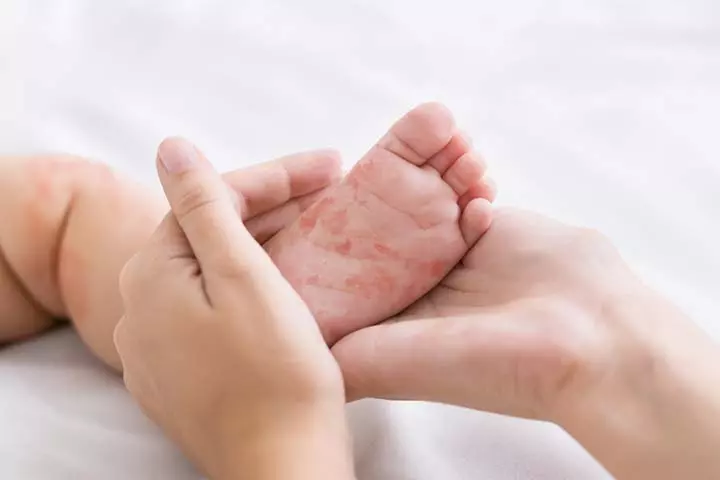
Image: Shutterstock
- Hyperactivity
- Insomnia
- Refusal to drink milk
Some babies may also exhibit digestive issues, such as upset stomach. If your baby shows any of these side effects, stop chocolate consumption temporarily and see if your baby recovers; else see a pediatrician.
Caffeine In Chocolate And Breastfeeding
- Chocolate may affect a nursing baby for many reasons but caffeine in it is believed to be the primary one.
- Less than 1% of caffeine that enters the mother’s bloodstream ends up in breast milk and would be at peak after an hour of consumption.
- A baby’s system takes a longer time to clear caffeine and high intake by the mother could make babies irritable.
- Moreover, a breastfeeding mother may find caffeine affecting her let-down reflex or making nipple vasospasm worse, in case she has it (1).
| Desserts | Amount | Caffeine |
|---|---|---|
| Dark chocolate (70-85% cocoa solids) | 1oz | 23mg |
| Milk chocolate | 1.55oz | 9mg |
| Coffee ice cream or frozen yogurt | 8oz | 2mg |
| Hot cocoa | 8oz | 8-12mg |
| Chocolate chips, semisweet | 4oz | 53mg |
| Chocolate milk | 8oz | 5-8mg |
Why High Caffeine Intake Irritates Breastfeeding Baby?

Image: Shutterstock
Half-life is the time required for the concentration of a substance in the body to become half. The half-life of caffeine is high in infants and makes it difficult for them to fall asleep (2). Thus, lactating women should stay wary of their total caffeine intake and focus on their diet and nutrition.
Theobromine In Chocolate And Breastfeeding
Theobromine is not a cause of worry for the nursing baby if the mother eats normal amounts of chocolate. A study has found that if a mother ate a 4-ounce chocolate bar every six hours and the baby was breastfed when the theobromine concentration in milk was at its peak, the baby could ingest about 10mg of theobromine a day (3).
Is Dark Chocolate Or White Chocolate Good During Breastfeeding?
Small amounts of dark chocolate is better than white chocolate. Dark chocolate has less sugar than white chocolate and contains flavonoids, which is good for your heart (4). White chocolate is highly processed and contains high levels of sugar.
 Nutrition fact
Nutrition factShould Chocolate-Mixed Foods Be Avoided When Breastfeeding?
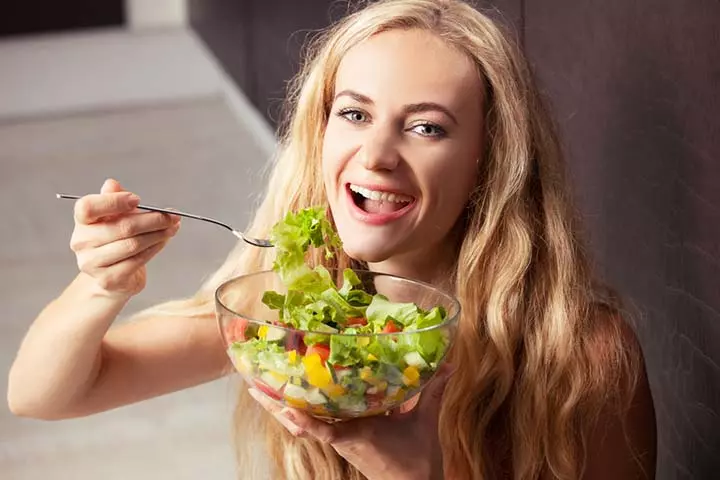
Image: Shutterstock
- Chocolate-mixed foods, such as chocolate cookies, chocolate ice creams, chocolate cakes, or chocolate almond milk, can be occasionally consumed during lactation. But remember that you need to take a nutritious maternal diet to maintain your health and provide the essential nutrients to your infant.
- A few babies may be intolerant to cow’s milk or have food allergies, such as nut or egg allergies. In such cases you should avoid products containing potential allergens, including chocolate.
Healthy Chocolate Recipe For Nursing Moms
If you cannot resist the temptation of relishing chocolate while breastfeeding, here’s one of the healthy recipes for breastfeeding moms that you may try.
Lactation chocolate chip cookies:

- 1 cup butter
- 1 cup brown sugar
- 1/2 cup granulated sugar
- 2 large eggs
- 2tsp vanilla extract
- 1½ cups all-purpose flour
- ¾tsp salt
- ½tsp baking powder
- 3tbsp ground flaxseed
- ⅓ cup brewer’s yeast
- 2tbsp almond butter
- 3 cups rolled oats
- 1½ cups chocolate chips
How To:
- Preheat your oven to 350°F and prepare two baking sheets by covering them with parchment paper.
- In a bowl, mix the butter, brown sugar, and granulated sugar until it’s fluffy and light.
- Add the eggs one at a time, and then mix in the vanilla.
- Mix the flour, salt, baking powder, flaxseed, and brewer’s yeast in a different bowl.
- Combine these dry ingredients with the mix in the first bowl, stirring until they just mix.
- Add the almond butter, oatmeal, and chocolate chips, blending until they’re just mixed in.
- Take about 1.5 tablespoons of dough and drop portions onto the lined sheets.
- Bake for 10-12 minutes until the base turns golden.
- Let them cool on the sheets for 10 minutes, then shift them to a wire rack for complete cooling.
- Keep your cookies fresh in an airtight container for about a week.
Frequently Asked Questions
1. How much caffeine can I consume while breastfeeding?
Every baby’s caffeine tolerance is different, and so you should adjust your intake based on your baby’s acceptance. Watch your baby for signs of irritability or inability to fall asleep.
2. Can I take chocolate laxatives while breastfeeding?
A few medications like chocolate laxative pass into breastmilk. Consult your doctor before using them.
3. Can I drink hot chocolate during breastfeeding?
You may limit it to one cup a day or take it in moderate amounts to limit the caffeine intake.
4. Can the consumption of chocolates cause colic in babies?
Chocolate contains caffeine, and eating it in large amounts can lead to the development of colic in babies. According to the Michigan State University Extension, nursing women should limit the consumption of chocolates if their babies seem colicky with no known cause (6).
5. Can I eat chocolate to increase my milk supply?
There are no studies that safely conclude that chocolate increases the breast milk supply. However, research shows that eating small amounts of chocolates is relatively safe (7). For optimum breast milk production and supply, it is best to consume a well-balanced diet so that the baby gets optimal nutrition.
6. Will my breastfed baby get diarrhea if I eat chocolates?
Sometimes maternal chocolate consumption might affect the baby’s digestive system and develop issues, such as diarrhea. But it is not wise to generalize this consequence. The effect varies with every baby. If the chocolate intake makes the baby fussy and causes diarrhea, restrict its intake as much as possible. Once your baby is in the weaning process, you may consume chocolate freely as long as there are no signs of an allergic reaction or other adverse effects in the baby.
Breastfeeding can leave one hungry and craving some chocolates. Nursing mothers may want to be sure before consuming chocolates while breastfeeding because of their caffeine content. However, moderation is the key, as too much chocolate may lead to caffeine passing through the breast milk. Moreover, chocolate is rich in sugar and fats; therefore, it is good to indulge in occasional bites. Dark chocolate may be a better choice as compared to white chocolate. Remember, following certain dietary restrictions when nursing is vital for the mother and her baby’s health.
Infographic: Side Effects Of Eating Excess Chocolate While Breastfeeding
Now that your pregnancy is over, do not go berserk about eating chocolate excessively. This is because whatever you eat while breastfeeding, including the chocolates, affects the baby. So, look through the infographic below to learn about various side effects your baby may face if you eat excess chocolate. Illustration: Momjunction Design Team
Learn how to embrace caffeine-containing products while breastfeeding. Learn helpful tips for striking a balance between caffeine consumption and breastfeeding.
Illustration: Is It Safe To Eat Chocolate While Breastfeeding?

Image: Stable Diffusion/MomJunction Design Team
References
- Breastfeeding and maternal caffeine consumption.
https://www.breastfeeding.asn.au/resources/caffeine-and-breastfeeding - A Nehlig and G Debry; (1994); Consequences on the newborn of chronic maternal consumption of coffee during gestation and lactation: a review.
https://pubmed.ncbi.nlm.nih.gov/8157856/ - B H Resman et al.; (1977); Breast milk distribution of theobromine from chocolate.
https://pubmed.ncbi.nlm.nih.gov/894424/ - CHOCOLATE.
https://mat.miracosta.edu/MAT125_Faulk_online/4DOWNLOAD/imagesFor4/Choc.html - Dark Chocolate.
https://nutritionsource.hsph.harvard.edu/food-features/dark-chocolate/ - A breastfeeding mother’s diet for an infant with colic.
https://www.canr.msu.edu/news/a_breastfeeding_mothers_diet_for_an_infant_with_colic - Chocolate.
https://www.ncbi.nlm.nih.gov/books/NBK532500/
Community Experiences
Join the conversation and become a part of our nurturing community! Share your stories, experiences, and insights to connect with fellow parents.
Read full bio of Joanne Aubrey
Read full bio of Swati Patwal
Read full bio of Rohit Garoo
Read full bio of Shinta Liz Sunny








